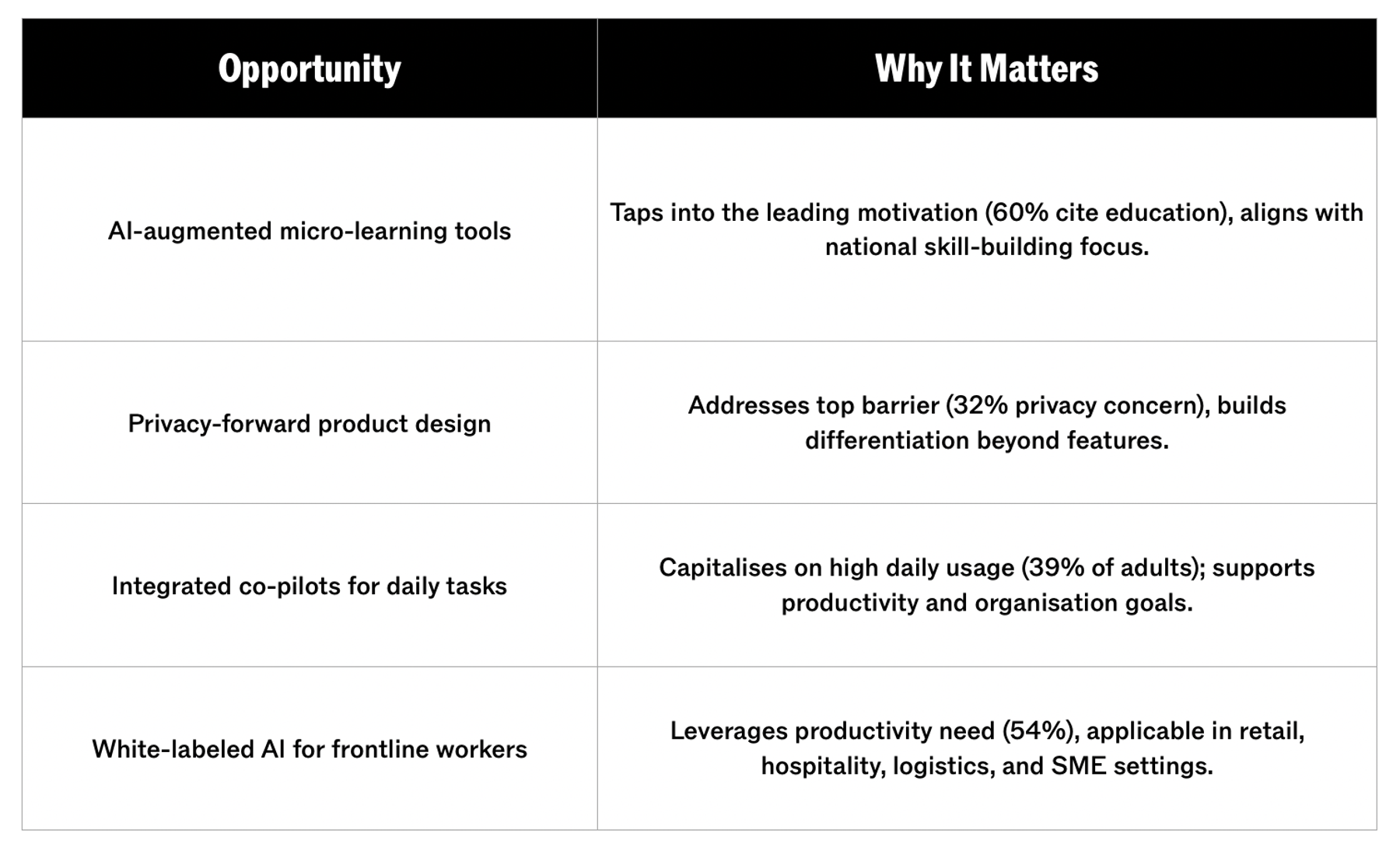
Singapore’s AI Momentum: Embedded, Everyday, and Evolving
◻️ Singapore is emerging as one of Asia’s most engaged AI markets, where daily usage is driven by learning, productivity, and trust in design. This article explores the key behaviours, barriers, and commercial opportunities shaping the next phase of AI adoption in Singapore.
AI adoption in Singapore has moved into a new phase. Once a space of experimentation, AI has become embedded in the daily routines, learning behaviours, and productivity strategies of mainstream consumers. The country now ranks among the most engaged AI user bases in Asia Pacific, with clear commercial signals for brands looking to build, expand, or localise AI-driven products.
New data from Protocol Theory’s latest APAC consumer research study reveals a high level of AI adoption and routine usage in Singapore. Just under half (46%) of all adults have used an AI tool or application. Among this group, nearly nine in ten (83%) now engage with AI-powered tools at least weekly. Singapore’s adoption curve has flattened into a behavioural baseline.
This trend suggests a consumer market that rewards consistency, trust, and utility. Products must move beyond introduction and instead focus on integrating AI into real, value-generating use cases.
A clear pattern of purpose-driven usage
The most common reason Singaporeans turn to AI is to support learning and education. 60% of AI users cite this as a key motivator, ahead of productivity or automation. This signals a strong appetite for tools that promote self-development and upskilling—especially those that support professional goals, language learning, or general knowledge-building.
Retention is also remarkably high. 83% of people who have tried AI-powered tools are now using them at least daily, suggesting that the first-use experience plays a critical role in long-term engagement. If a product delivers meaningful value from the start, continued usage is highly likely.
This places pressure on product teams to front-load utility. Features such as auto-summarisation, goal tracking, or productivity boosts should be accessible within minutes of signup. Singapore’s user base is technically literate and outcome-driven, and rewards tools that minimise friction and maximise usefulness early in the journey.
Some still prefer the human touch
Despite strong uptake, 32% of Singaporeans express concerns about data privacy when using AI tools—a higher rate than the regional average. Other trust-related barriers include a preference for human interaction (28%) and discomfort with AI decision-making (20%).
These figures suggest that although fully autonomous experiences may have limited appeal in sensitive or service-heavy domains, there is strong potential for hybrid models—AI co-pilots that support but don’t replace human decision-makers. This is particularly important in sectors like healthcare, finance, education, and government, where personalisation and empathy play a central role.
Confidence in automation supports faster AI rollout
Confidence in workforce adaptability opens the door for intelligent automation Singaporeans are notably less concerned about AI-driven job displacement than many of their regional counterparts. Only 22% of respondents cited this as a barrier to adoption—significantly lower than in markets like the Philippines (41%) and the UAE (33%). While privacy and interpersonal trust remain key considerations, the fear of losing employment to automation appears to be less salient in Singapore’s digital landscape.
This suggests a broader confidence in the country’s workforce adaptability and digital skill base. It also reflects national narratives around upskilling and tech-readiness, reinforced by initiatives such as SkillsFuture and widespread public investment in digital transformation.
For AI companies and enterprise solution providers, this creates favourable conditions for introducing automation-first workflows, particularly in professional services, logistics, customer support, and back-office operations. Adoption is unlikely to be hindered by fears of obsolescence—so long as tools are positioned as amplifiers of human capability rather than replacements.
Key Commercial Opportunities

Final Thought
As with many other countries globally, AI is becoming a stable part of everyday life in Singapore. Consumers are engaging regularly, driven by clear goals such as learning, productivity, and task management. Most users recognise the benefits and are actively incorporating AI into their routines.
This creates strong conditions for commercial growth. Products that deliver immediate utility, support daily habits, and demonstrate responsible data practices will be well positioned in the Singaporean market. The next wave of AI adoption will be shaped by design choices that prioritise usability, transparency, and personal relevance. ◼️
Want to understand how consumers in your market are adopting AI—and what they expect next?
Protocol Theory helps leading brands turn behavioural data into strategic advantage. Get in touch to explore how our insights can shape your product, marketing, or innovation roadmap.